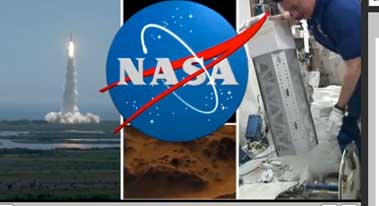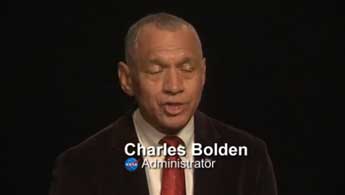
NASA announced Monday a $17.7 billion budget request for fiscal year 2013 supporting an ambitious program of space exploration that will build on new technologies and proven capabilities to expand America's reach into the solar system.
Despite a constrained fiscal environment, the NASA FY13 budget continues to implement the space science and exploration program agreed to by President Obama and a bipartisan majority in Congress, laying the foundation for ground-breaking discoveries here on Earth and in deep space, including new destinations, such as an asteroid and Mars by 2035.

The NASA budget includes $4 billion for space operations and $4 billion for exploration activities in the Human Exploration Operations mission directorate, including close-out of the Space Shuttle Program, and funding for the International Space Station, $4.9 billion for science, $669 million for space technology and $552 million for aeronautics research.
"This budget puts us on course to explore farther into space than ever before, revealing the unknown and fueling the nation's economy for years to come," Deputy Administrator Lori Garver said. "We are committed to ensuring that our astronauts are once again launched from U.S. soil on American-made spacecraft, and this budget provides the funds to make this a reality."
The budget supports NASA's continued work to develop the Space Launch System, a new heavy-lift rocket to carry astronauts to destinations such as an asteroid and Mars, and the Orion crew capsule in which they will travel. Included are resources for final preparation and manufacturing milestones for Orion's 2014 Exploration Flight Test 1 and preliminary design reviews of major Space Launch System elements.
NASA has prioritized funding for its partnership with the commercial space industry to facilitate crew and cargo transport to the station. The $830 million for this work in the FY13 budget advances progress towards a vibrant space industry that will create well-paying, high-tech jobs to the U.S. economy, and reduce America's reliance on foreign systems.
The budget also enhances use of the International Space Station to improve life on Earth and help make the next great leaps in scientific discovery and exploration.
NASA's science budget supports a balanced portfolio of innovative science missions that will reach farther into our solar system, reveal unknown aspects of our universe, and provide critical data about our home planet. The agency will continue to develop and conduct critical tests on the James Webb Space Telescope leading to its planned launch in 2018. As the successor to Hubble Space Telescope, James Webb again will revolutionize our understanding of the universe. NASA also is developing an integrated strategy to ensure the next steps for the robotic Mars Exploration Program will support science as well as long-term human exploration goals.
Space Technology work supported in the budget will drive advances in new high-payoff space technologies such as laser communications and zero-gravity propellant transfer, seeding innovation that will expand our capabilities in the skies and in space, supporting economic vitality, lowering the cost of other government and commercial space activities, and helping to create new jobs and expand opportunities for a skilled workforce.
NASA supports its commitment to enhancing aviation safety and airspace efficiency, and reducing the environmental impact of aviation by helping to accelerate the nation's transition to the Next Generation Air Transportation System through investments in revolutionary concepts for air vehicles and air traffic management.
"The 2013 budget moves us forward into tangible implementation of a sustainable and affordable exploration program," NASA's Chief Financial Officer Elizabeth Robinson said. The NASA budget and supporting information are available at.

